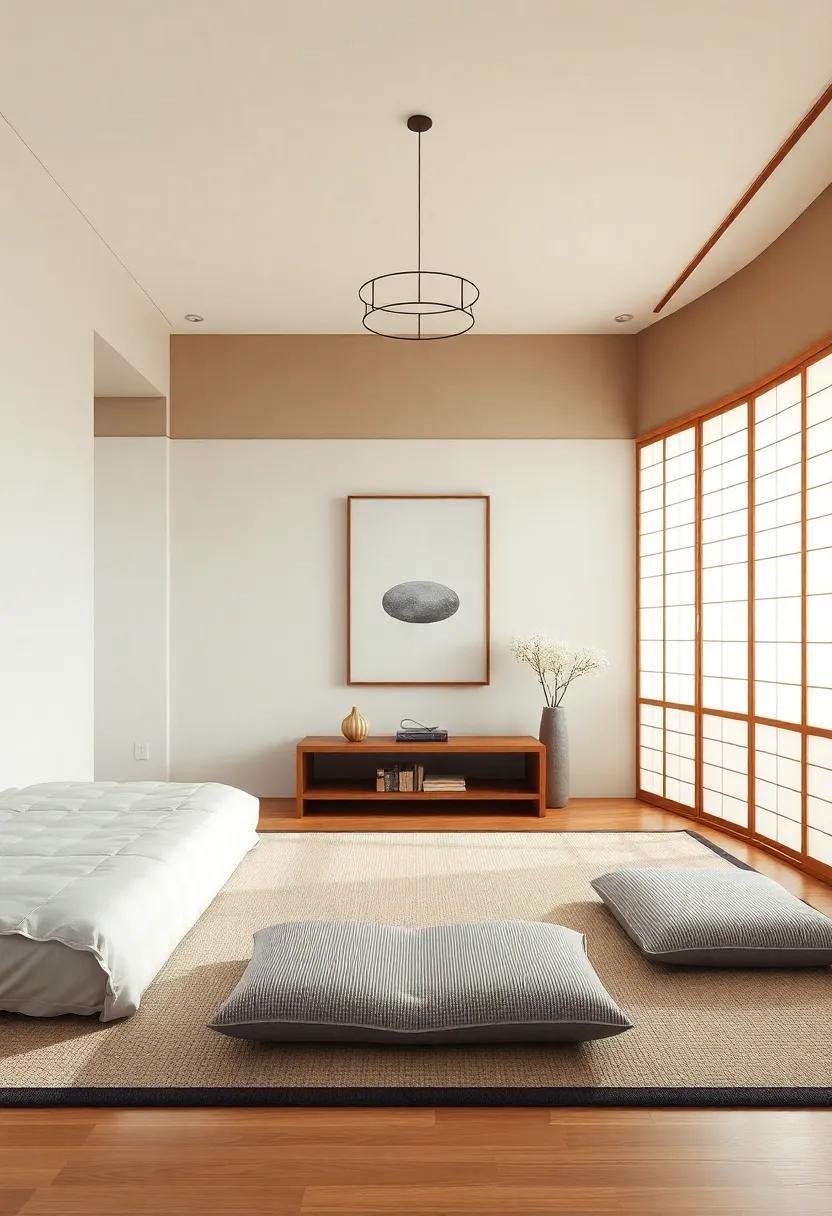In a world that frequently enough feels chaotic and fast-paced, the quest for tranquility within our personal spaces has become increasingly vital.Among the various approaches to cultivating a peaceful atmosphere, the Japanese bedroom stands out as a symbol of serene simplicity and mindful design. Embracing natural elements and a minimalist aesthetic, this conventional style creates a sanctuary where one can unwind and reconnect with themselves. At the heart of this tranquil haven lie inviting floor cushions—soft, versatile pieces that transform a room into a cozy retreat. Join us as we explore the art of japanese bedrooms, uncovering the philosophy behind their design and the thoughtful placement of floor cushions that invite comfort, relaxation, and a touch of elegance. Whether you’re looking to create a serene sanctuary in your own home or simply wish to appreciate the beauty of this timeless style, let this journey inspire you to embrace serenity in your everyday life.
Embracing Minimalism in Japanese Bedroom Design
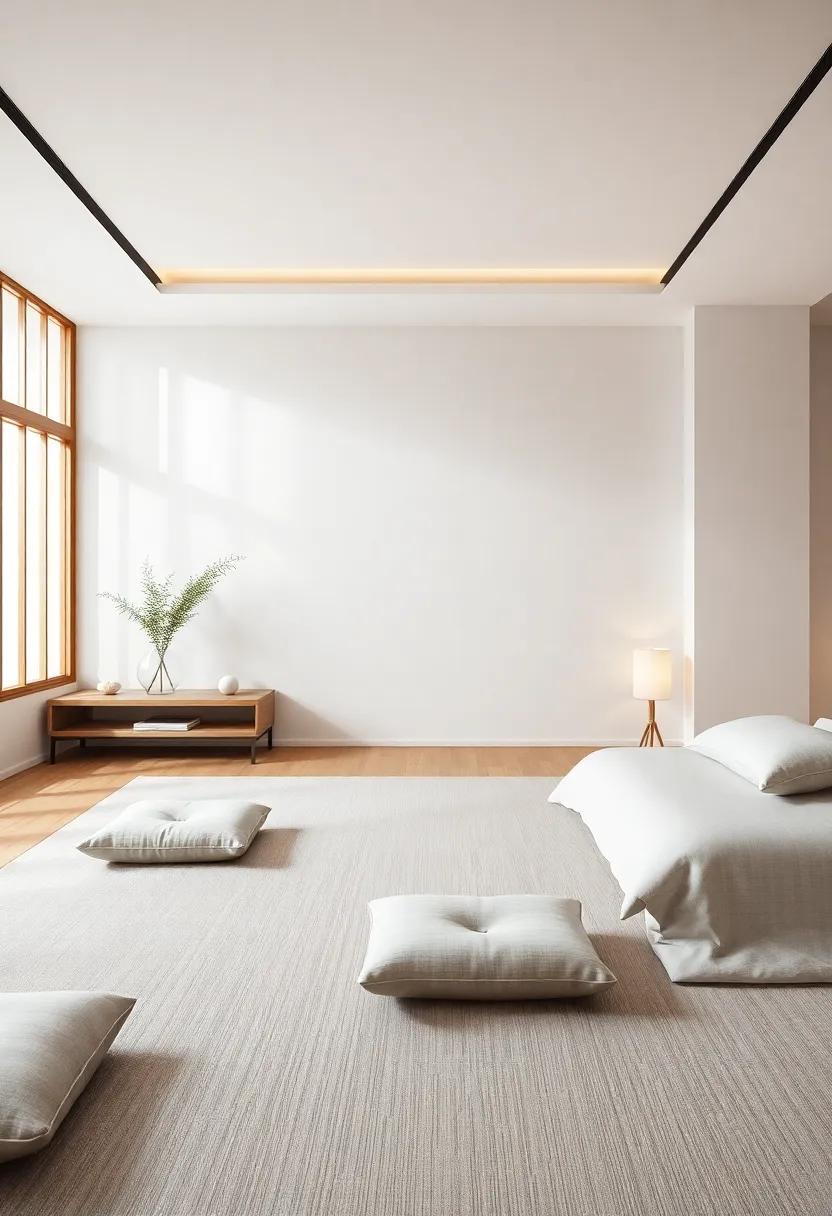
In the heart of Japanese bedroom design lies a deep thankfulness for simplicity and tranquility. This aesthetic fosters an surroundings where less truly is more, encouraging a sense of calm in our often chaotic lives.Key elements include:
- Natural Materials: Incorporating wood, rice paper, and organic textiles enhances the connection with nature.
- Neutral Color Palettes: Soft, earthy tones promote a serene atmosphere.
- Functional Layout: Open spaces with minimal furniture allow for fluid movement and a sense of freedom.
Central to this design philosophy are inviting floor cushions, which transform the space into a cozy retreat. These cushions not only serve as pleasant seating but also emphasize the low-profile living typical of traditional Japanese homes. By incorporating:
- Layered Textures: Combining various fabrics can create warmth and depth.
- versatile Arrangements: Cushions can be easily moved to adapt to different activities, from meditation to gatherings.
- Thoughtful Accessories: Using simple decor, such as bonsai plants or calligraphy, enhances the minimal vibe without overwhelming the senses.
ul {
margin-bottom: 20px;
}
strong {
color: #333;
}
The Warm Embrace of Floor Cushions in Cozy Spaces
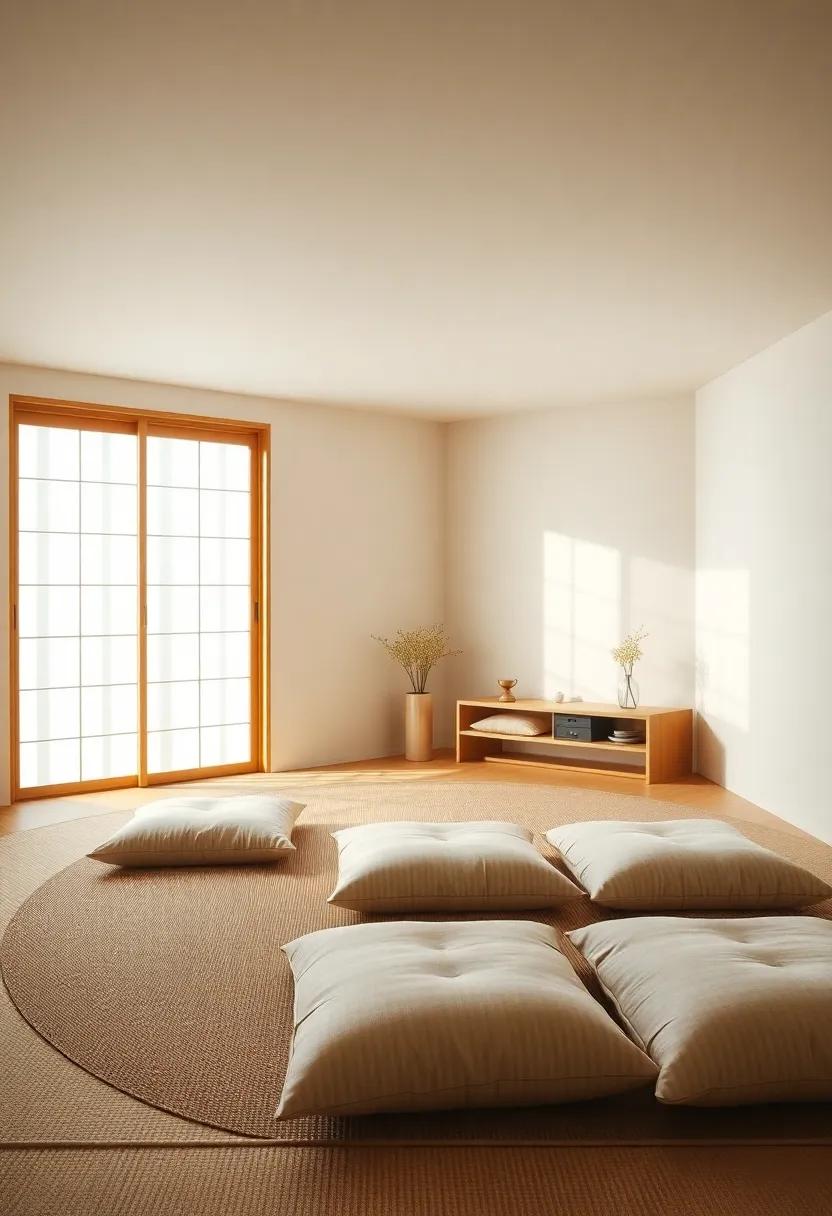
Floor cushions offer a delightful contrast to the rigidity of traditional furnishings, transforming any living space into a sanctuary of comfort and warmth. Their plushness invites you to sink in and relax, creating an environment that encourages unwinding after a long day. In a Japanese-inspired bedroom, these cushions not only serve as a practical seating option but also enhance the aesthetic, melding seamlessly with the minimalist design. The juxtaposition of soft textures against clean lines fosters an atmosphere of tranquility, inviting you to linger and reflect.
Incorporating floor cushions into your cozy spaces can be as easy as selecting a few vibrant colors or calming neutrals to harmonize with your existing decor. Consider these ideas to make the most of floor cushions in your serene setting:
- Layered Textures: Combine cushions of different sizes and fabrics for a visually appealing arrangement.
- Strategic Placement: Position cushions near low tables or within alcoves to create intimate seating areas.
- Seasonal Themes: Swap out fabrics and colors to reflect the seasons, from airy pastels in spring to deep warm tones in fall.
| Material | Benefits |
|---|---|
| Cotton | Soft, breathable, and easy to clean. |
| Linen | Luxurious feel and natural texture. |
| Velvet | Rich appearance that adds warmth and elegance. |
Serenity through Natural Light: windows as a Design Element
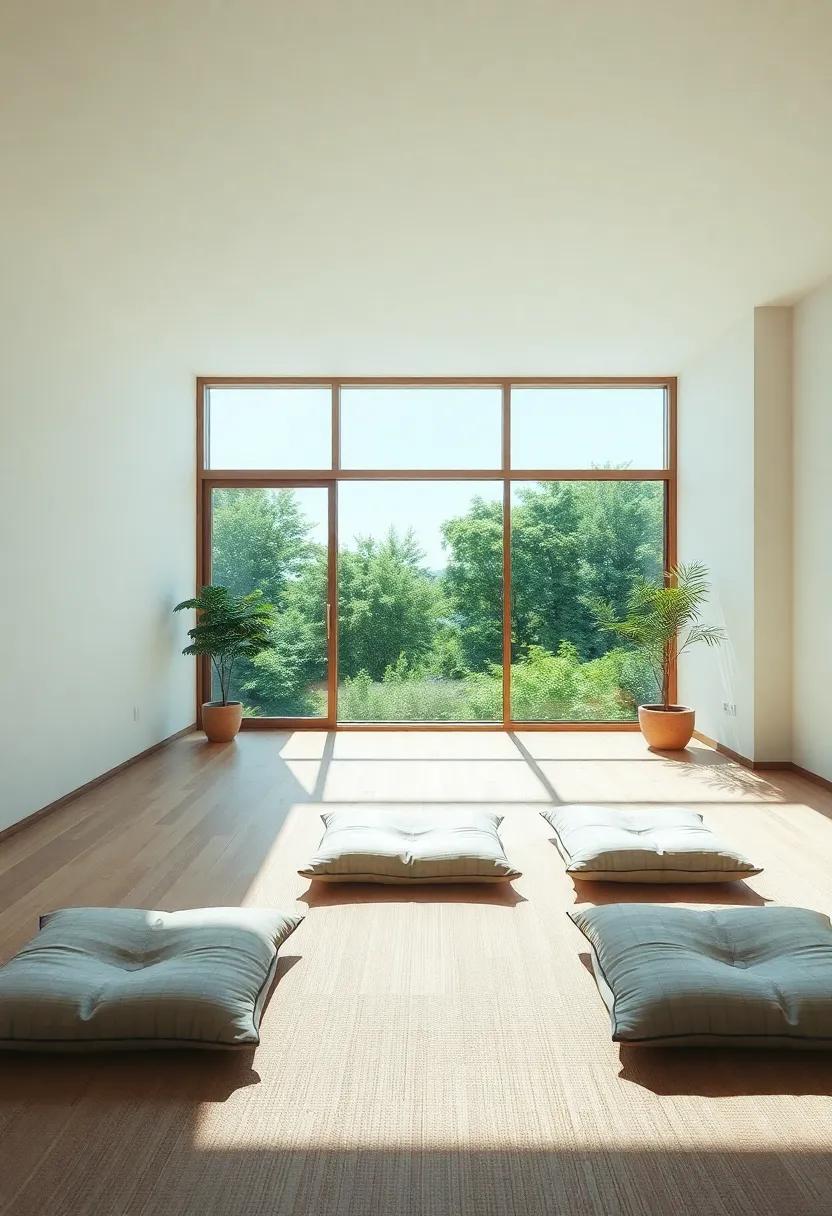
Natural light is an essential component of creating a tranquil atmosphere in any space, particularly in a Japanese-inspired bedroom.Large windows framed with minimalistic designs allow for the gentle diffusion of sunlight, /monochrome-magic-designing-a-stylish-black-and-white-industrial-bathroom/” title=”Monochrome Magic: …ing a Stylish Black-and-… Industrial Bath…”>casting soft shadows and illuminating the room with a warm glow. This connection to the outdoors emphasizes a sense of harmony and serenity, which is deeply rooted in Japanese aesthetics. The use of shoji screens can further enhance this effect, allowing light to filter through while maintaining privacy, thus marrying functionality with beauty.
To optimize the calming effects of sunlight, consider integrating various design elements that complement the natural lighting. Floor cushions provide a cozy seating option that invites relaxation and reflection, creating an ambiance where comfort is paramount. Additionally, the choice of colors in the room should be soft and neutral, echoing the natural world outside. Here are some ways to incorporate these elements:
- Transparent window treatments to maximize light exposure.
- Earth-toned cushions that harmonize with the indoor palette.
- Minimal furniture to prevent overcrowding and maintain a sense of openness.
Color Palette Harmony: soft Hues for a Calming Atmosphere
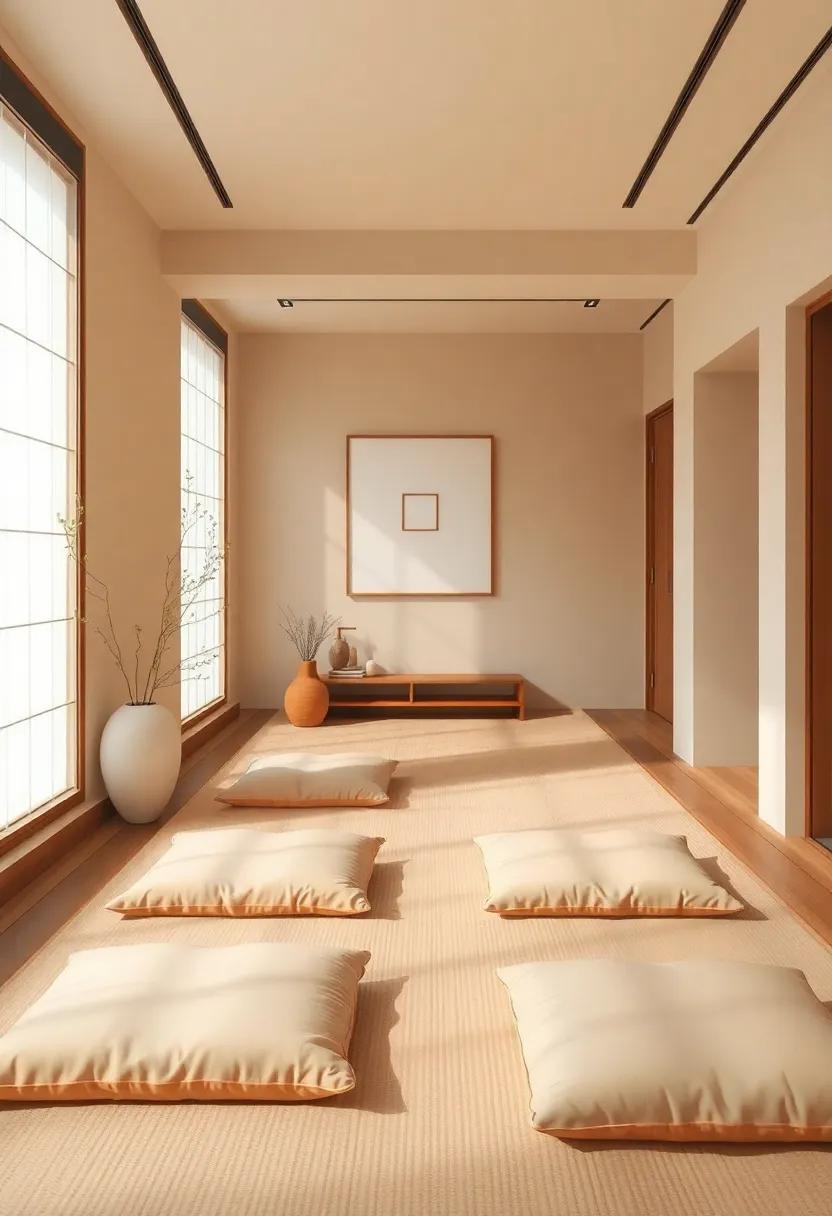
Choosing a color palette that embodies soft hues can transform a bedroom into a tranquil retreat. Shades of pale blue, gentle green, and warm beige harmonize beautifully, creating a serene environment that encourages relaxation. These colors not only bring a sense of peace but also complement the natural materials commonly found in Japanese design. Imagine walls adorned with a soothing light gray and delicate accents of white, reminiscent of cherry blossom petals drifting in a gentle breeze. when incorporated thoughtfully, these tones can enhance the soothing characteristics of your space.
To elevate the calming ambiance even further, consider incorporating materials that reflect these serene colors. Textiles such as cotton, linen, and bamboo enrich the softness and maintain an organic feel. Below is a simple table illustrating color pairings that evoke tranquility:
| Color | Complement |
|---|---|
| Pale Blue | Soft White |
| Gentle Green | Light Beige |
| Warm Taupe | Muted Coral |
By curating these subtle combinations, every corner of your bedroom beckons relaxation, encouraging mindfulness and serenity. This harmony not only reflects the beauty of japanese aesthetics but also invites you to unwind and breathe deeply, embracing the peace that comes from a meticulously designed space.
The Role of Tatami Mats in Japanese Bedroom Aesthetics
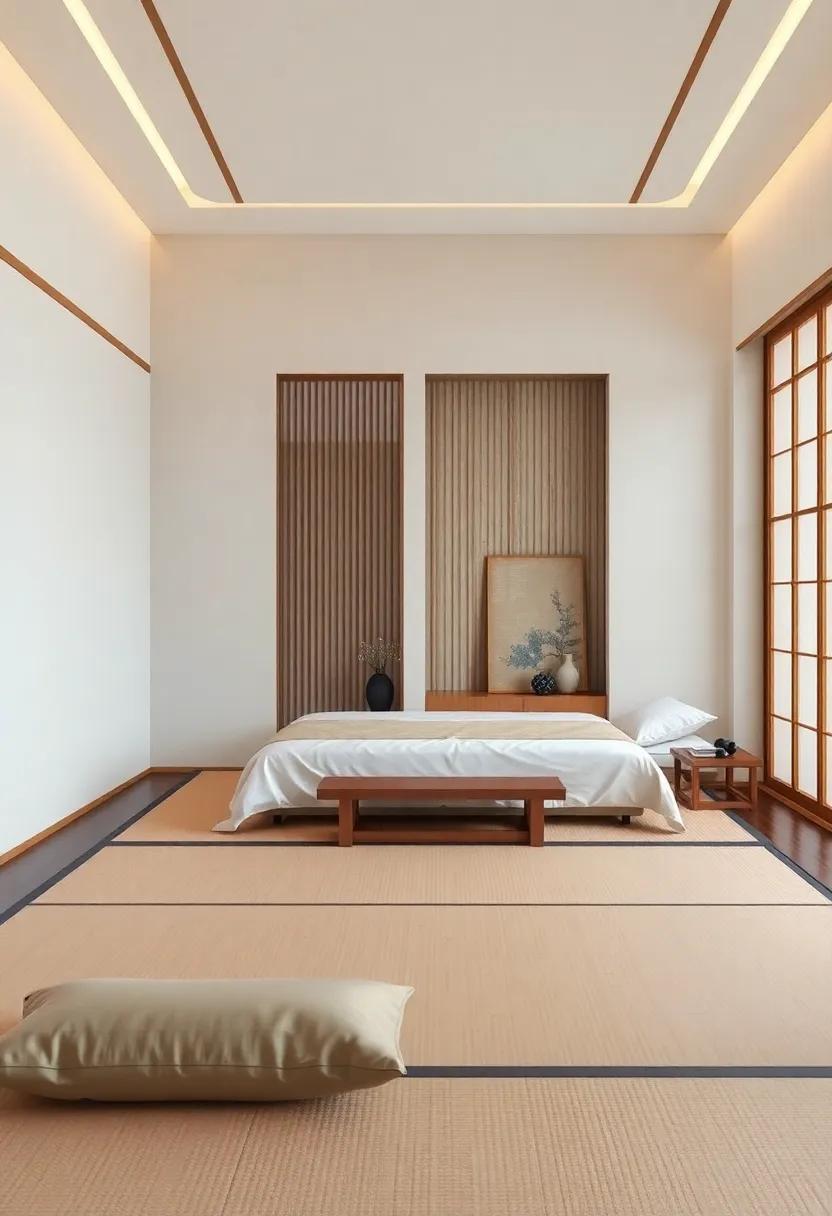
Tatami mats, traditional Japanese floor coverings made from straw and rice straw, are more than just practical flooring solutions; they embody a unique aesthetic that encourages a tranquil atmosphere in Japanese bedrooms. The subtle texture and natural materials of tatami mats promote a sense of connection to the earth, creating a serene and inviting space. their characteristic pale green hue imbues the room with an organic vibe,while the gentle sound of footsteps on the tatami enhances the peaceful ambiance. As an integral element of Japanese interior design, tatami mats also serve as a blank canvas, allowing the vibrant hues and patterns of floor cushions to stand out and contribute to the room’s overall warmth and approachability.
Along with their aesthetic role, tatami mats are functional and versatile. They are traditionally arranged in various layouts, often complemented by cozy floor cushions that invite relaxation and informal gatherings. Arranging these cushions on tatami creates an intimate setting perfect for housing conversations or enjoying quiet moments of contemplation. The natural breathability of tatami also helps maintain comfort throughout the changing seasons. When combined with the minimalist principles of Japanese design,the interplay of tatami mats and inviting floor cushions results in a harmonious balance of form and function,embodying the essence of simplicity while enhancing the bedroom’s beauty.
Incorporating Traditional Sliding Doors for Fluid Layouts
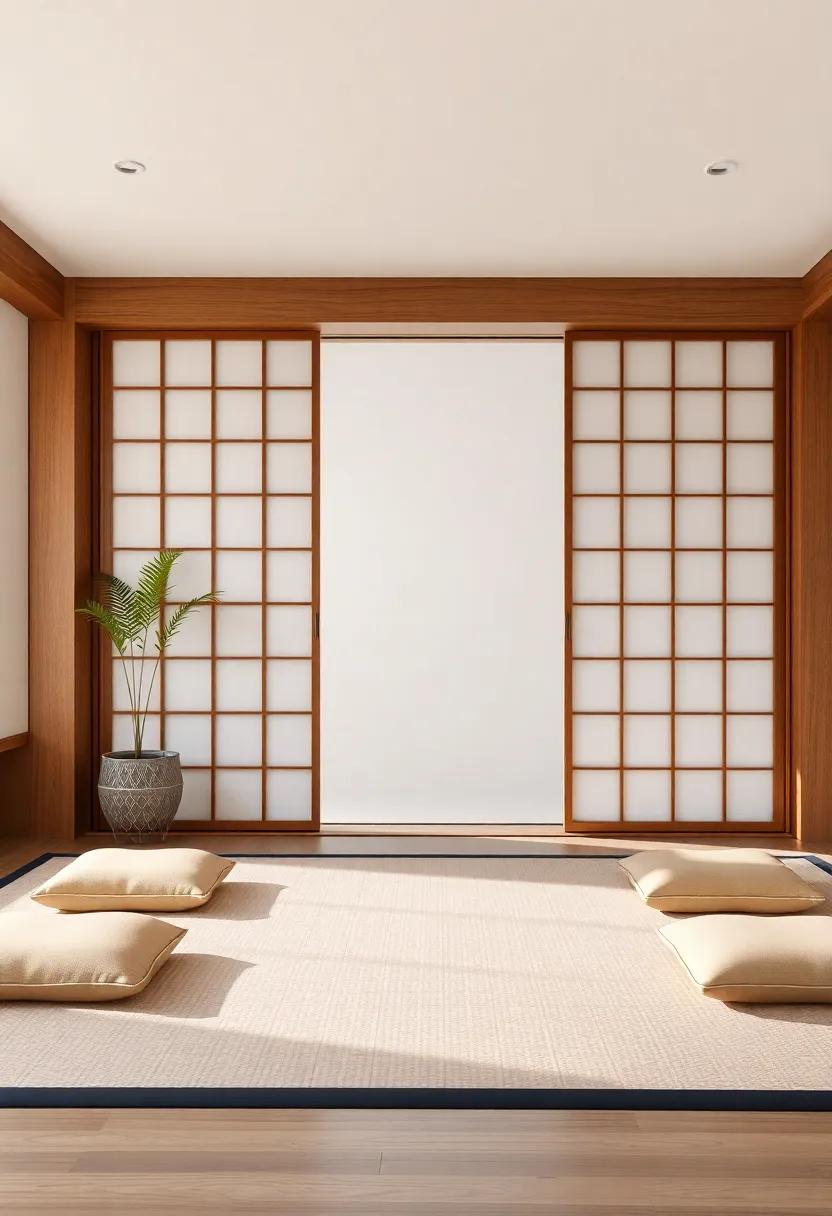
In contemporary interior design, the integration of traditional sliding doors can transform a space, offering adaptability and aesthetic appeal. These beautifully crafted doors, known as fusuma, not only serve a practical purpose but also enhance the fluidity of room layouts. They allow for seamless transitions between different areas,creating a harmonious flow that is characteristic of Japanese aesthetics. By opting for these doors, homeowners can easily adjust their living spaces to meet the needs of various activities, be it a tranquil meditation space or an animated gathering.
To fully appreciate the beauty and functionality of sliding doors, consider incorporating elements such as:
- Natural Materials: Utilize wood and paper finishes that reflect traditional Japanese craftsmanship.
- minimalist Designs: Choose designs that maintain simplicity, avoiding overly ornate patterns that disrupt the serene environment.
- Multifunctional Spaces: Create rooms that serve dual purposes—like a bedroom that can be transformed into a cozy reading nook with the push of a door.
| Benefits of Sliding Doors | Key Features |
|---|---|
| Space Saving | Slide aside rather than swing open, allowing maximum use of floor space. |
| Versatility | Can be used to separate rooms or create more open areas as needed. |
| Aesthetic Appeal | Adds a touch of elegance and tradition to modern spaces. |
The Art of Arrangement: Creating Inviting Seating Areas
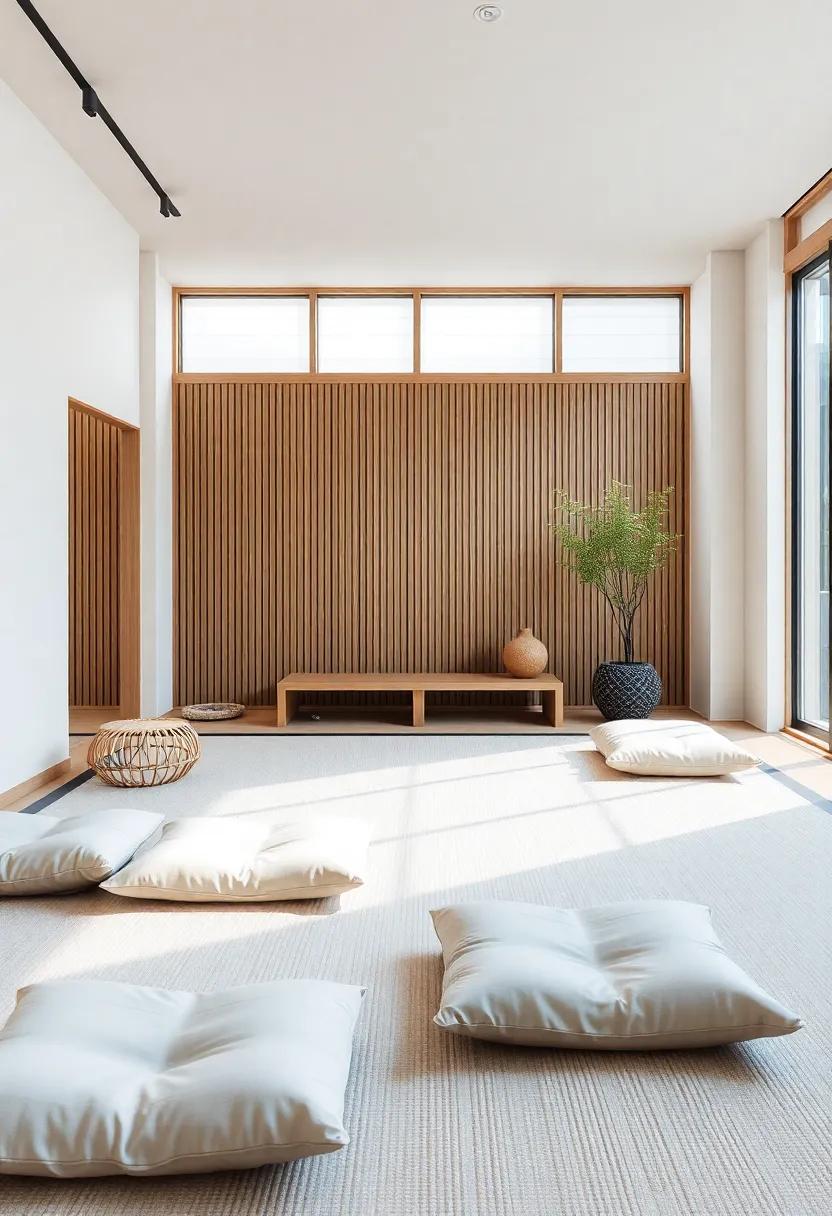
Creating truly inviting seating areas within a Japanese bedroom revolves around the idea of balance, simplicity, and functionality. Floor cushions, or *zabuton*, play an essential role in this arrangement, providing both comfort and authenticity. To enhance the calm aesthetic typical of Japanese design,consider:
- Layering Textures: Combine various fabrics for the floor cushions,such as cotton and silk,to create a tactile experience.
- Utilizing Natural Materials: Embrace bamboo or wood elements in your furniture to complement the cushions and accentuate the serene vibe.
- Arranging with Mindfulness: Position cushions in a way that invites conversation or quiet reflection, focusing on symmetry and flow.
Additional considerations, such as the use of color palettes and lighting, can significantly influence the ambiance of the space. Soft, neutral shades can evoke tranquility, while well-placed ambient lighting enhances the overall warmth. A few functional pieces, like a low table or an elegant lantern, can serve as focal points in the arrangement. Ideally, maintain an open layout that promotes ease of movement, embodying the essence of Japanese minimalism:
| Element | Effect |
|---|---|
| Floor Cushions | Enhance comfort and informality |
| bamboo Furniture | Brings nature indoors |
| Ambient Lighting | Creates a warm, inviting atmosphere |
Textures That Transcend: Exploring Fabrics for Floor Cushions
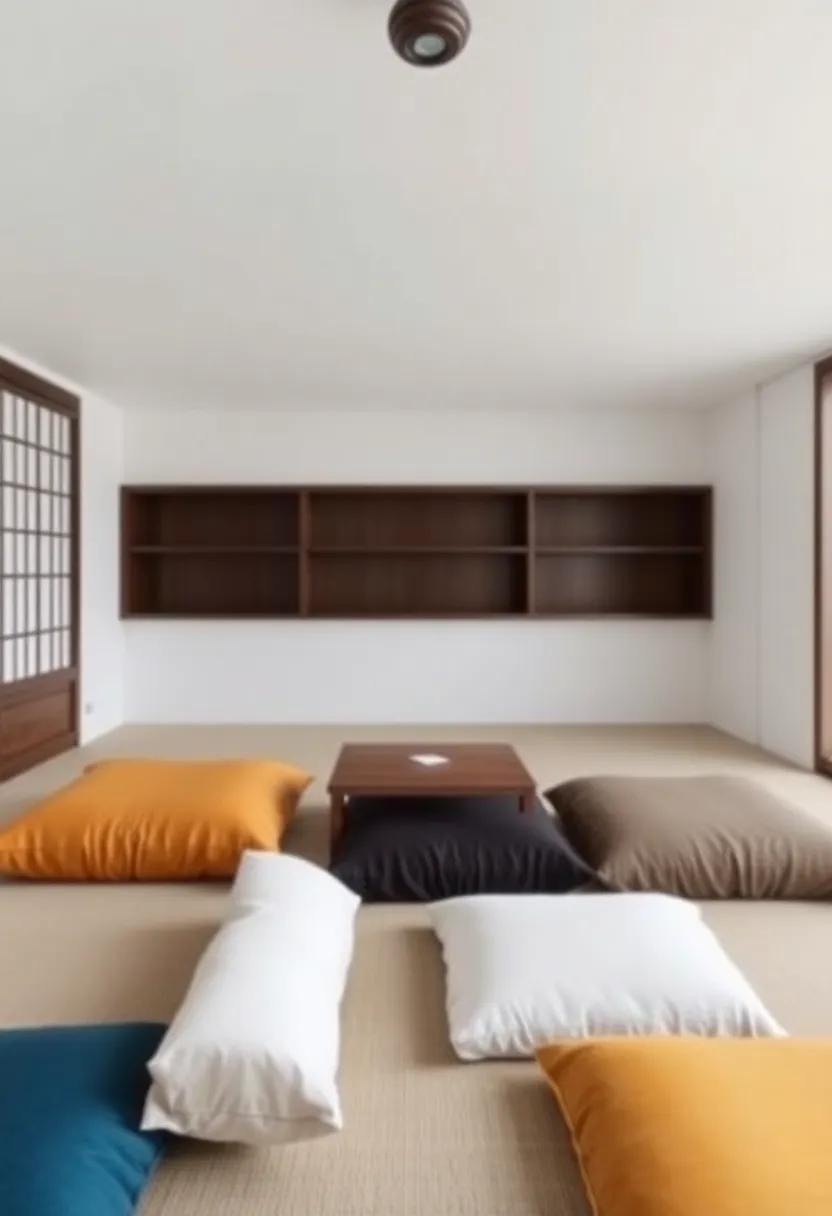
In the world of Japanese design, the interplay of simplicity and comfort is beautifully exemplified through the choice of fabrics for floor cushions. Natural fibers reign supreme, as they not only enhance the aesthetic appeal but also promote a serene atmosphere. Some ideal fabric choices include:
- Organic Cotton – soft to the touch and breathable, it’s perfect for everyday seating.
- Linen – With its textured finish, linen adds a rustic charm while remaining durable.
- Enduring Jute – A unique option that brings an earthy vibe, ideal for bohemian styles.
Each of these materials brings forth a tactile experience that resonates with the principles of Zen. When selecting cushions, considering color palettes that embody calmness, such as muted earth tones and gentle pastels, can further enhance the tranquil environment. Here’s a quick comparison of popular fabric options:
| Fabric | texture | Care Level |
|---|---|---|
| Organic Cotton | Soft & Smooth | Easy |
| Linen | Textured & Crisp | Moderate |
| Sustainable Jute | Rough & Natural | Moderate |
Layers of Comfort: Combining Cushions and Throws
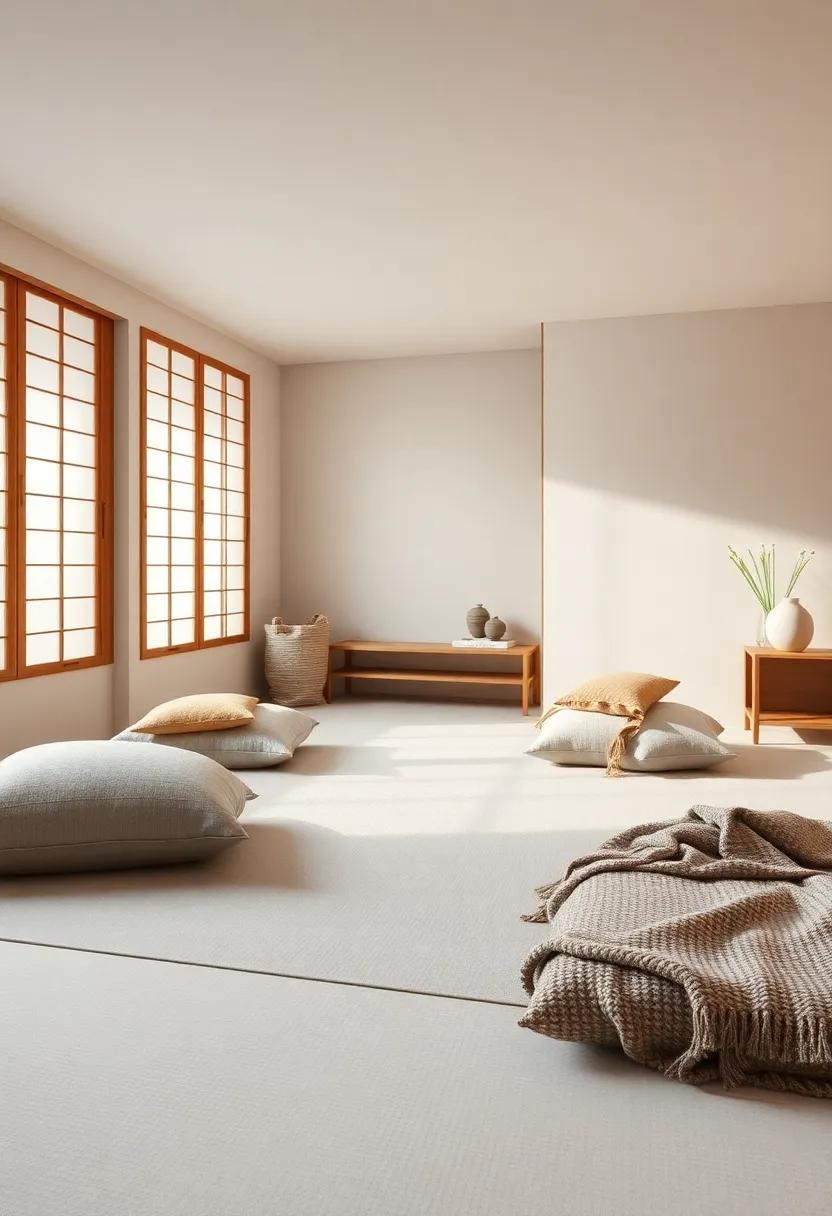
Transforming your bedroom into a serene haven involves more than just choosing the right furniture; it’s about layering comfort through thoughtfully selected textiles.Cushions offer a versatile way to introduce softness and color, while throws add an effortless touch of warmth. Consider mixing various shapes and sizes of cushions to create a cozy seating area on the floor. Opt for cushions made from natural materials like cotton or linen to maintain that tranquil, Japanese-inspired aesthetic. Complement these with beautifully draped throws that invite relaxation, offering a tactile contrast against smooth wooden surfaces.
To achieve a harmonious blend, play with different colors and patterns that resonate with nature, such as muted greens, soft grays, or delicate floral prints. A simple arrangement can include:
- Two large floor cushions for lounging
- Mid-sized cushions tucked nearby for added support
- A patterned throw casually layered across a cushion
The result is an inviting atmosphere that encourages unwinding after a long day. For an added dimension, consider using a table like this to showcase recommended materials:
| Material | Benefits |
|---|---|
| Cotton | Breathable and easy to clean |
| Linen | Durable with a natural texture |
| Wool | Warm and cozy for cooler months |
By thoughtfully combining these elements, you create a layered sanctuary that perfectly embodies the essence of comfort and rejuvenation, enhancing the tranquility of your Japanese-inspired bedroom.
Artistic Expression: Wall Decor Inspired by Nature
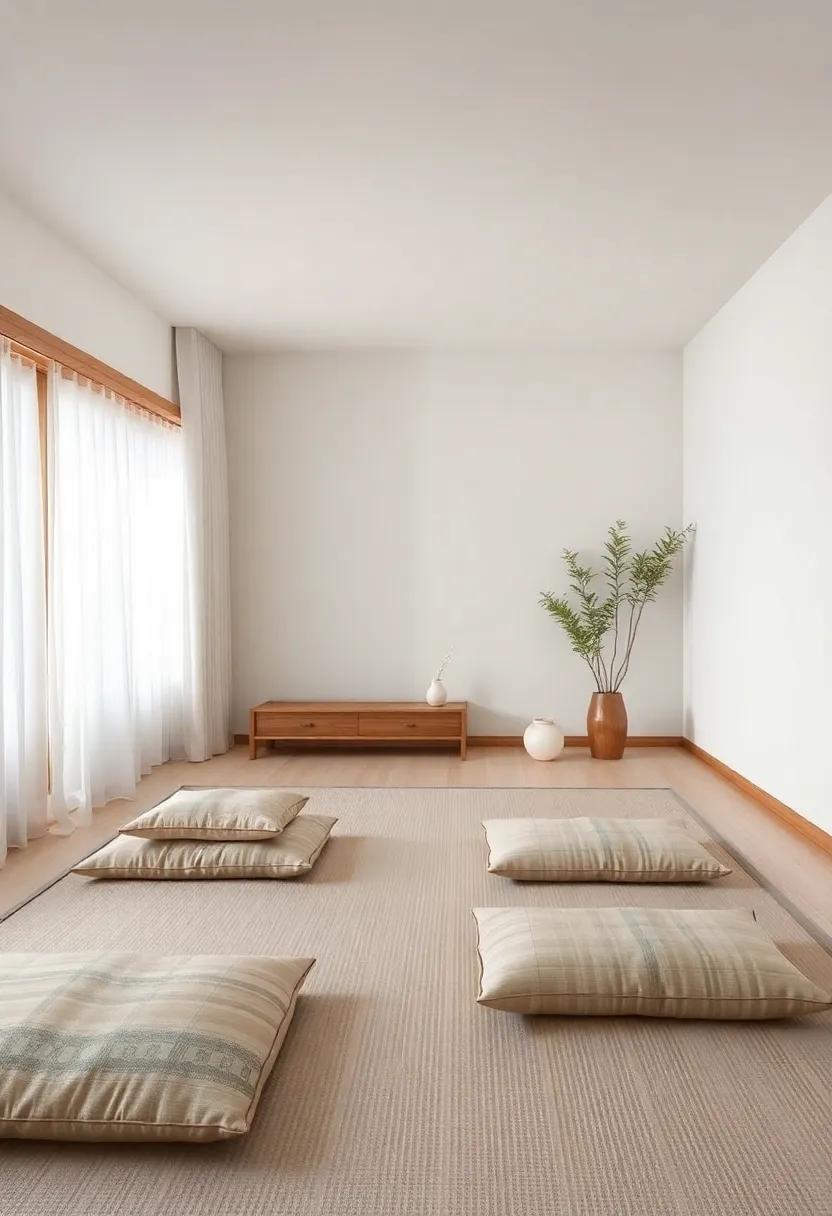
Creating a serene atmosphere in your bedroom can be achieved through thoughtful wall decor that draws inspiration from the natural world. Nature possesses an innate ability to promote calmness, making it a perfect muse for artistic expression.Consider incorporating elements like watercolor landscapes, botanical prints, and textured wall hangings that feature organic shapes and earthy tones. These pieces can serve as focal points or subtle accents, each telling a story of tranquility that resonates with the spirit of the space.
To deepen the connection between your decor and nature, explore the use of materials that reflect the organic world. Natural wood frames or bamboo panels can provide an eco-pleasant touch, while the addition of handcrafted ceramics allows for a tactile experience that invites intimacy. Consider these ideas for your wall decor:
- framed pressed leaves or flowers
- Large canvas prints of mountain vistas
- Hand-painted river stones displayed in a shadow box
By harmonizing colors,textures,and imagery that remind you of the great outdoors,your bedroom will not only reflect your personal style but also cultivate a sense of peace that beckons relaxation.
Mindful Design: Decluttering Your Japanese Bedroom
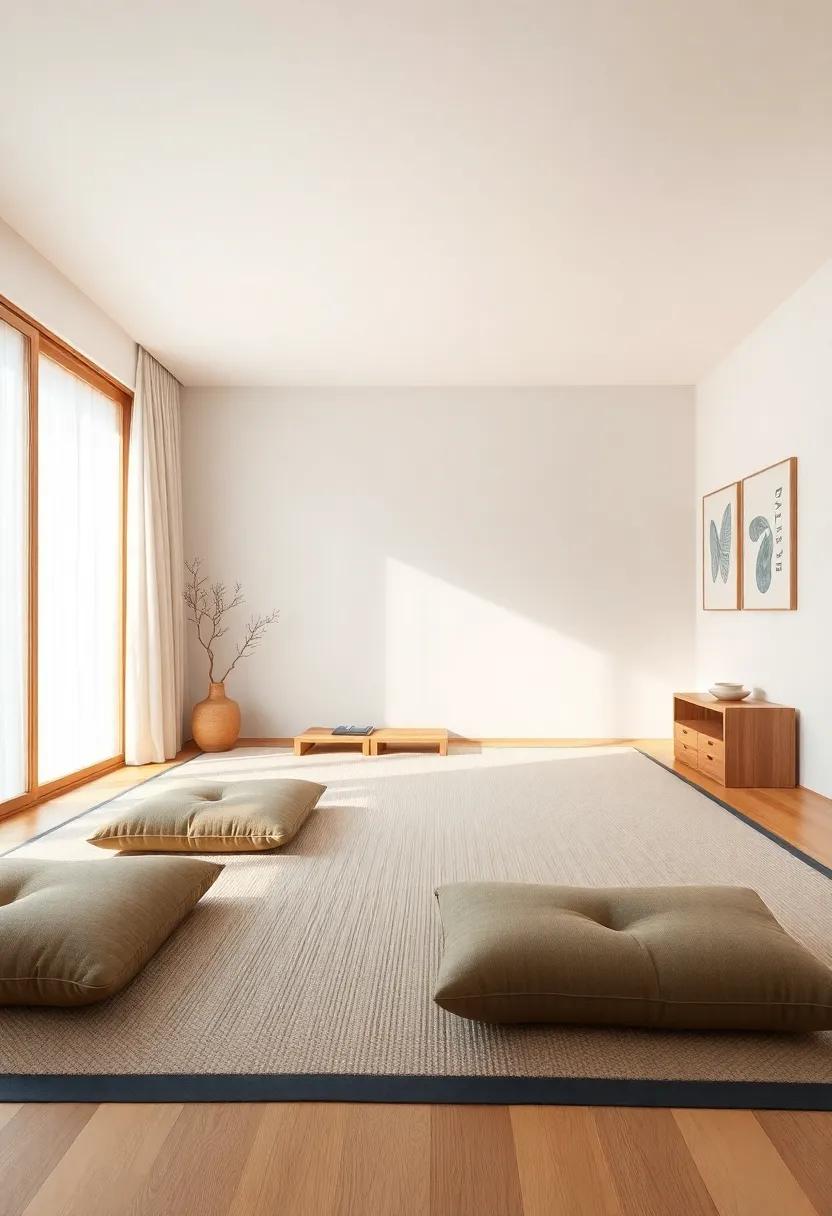
Creating a serene ambiance in your Japanese bedroom begins with mindful decluttering. Start by assessing the items you truly need and cherish. Japanese aesthetics emphasize simplicity and functionality, so consider eliminating items that do not serve a purpose or bring you joy. This approach not only promotes a clean environment but also enhances your mental clarity. Focus on integrating natural elements,such as wooden furniture and soft textiles,that evoke tranquility and are easy to maintain. The goal is to create open spaces that allow for gentle movement and a harmonious flow.
Once you’ve streamlined your belongings,it’s time to introduce unique features like inviting floor cushions. These cushions are not just decorative; they enhance the usability of the space while promoting comfort. Consider arranging the cushions in cozy clusters for meditation or casual gatherings, inviting warmth and connection.Here are some tips to maximize the potential of your floor cushions:
- Choose cushions in earthy tones to connect with nature.
- Incorporate varying sizes and textures for visual interest.
- Position them near windows or in quiet corners for added serenity.
By thoughtfully incorporating floor cushions into your design, you create inviting spots that encourage relaxation and mindfulness, making your Japanese bedroom a true retreat from the busyness of daily life.
Creating a Zen Corner: Meditative Spaces with Cushions
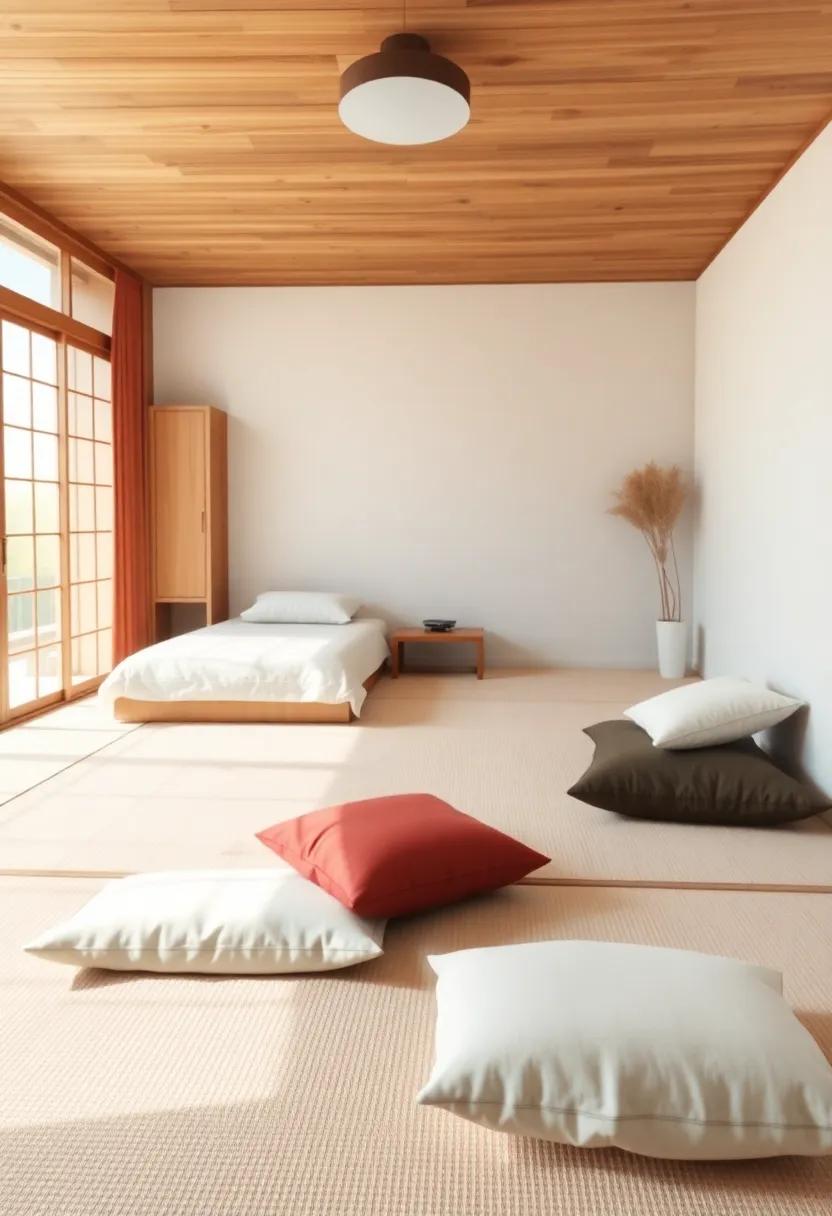
Transforming a corner of your home into a zen oasis begins with the right choice of cushions. Floor cushions are not only aesthetically pleasing but also serve as the perfect companions for meditation and relaxation. They invite you to sit,breathe,and embrace tranquility. Consider choosing natural fabrics like cotton or linen in hues that evoke calmness, such as soft greens, gentle grays, or earthy tones. Layer different sizes and shapes of cushions to create a dynamic yet cozy atmosphere. Placing these cushions around a low table or near a window that offers a glimpse of nature can enhance the serene vibe, encouraging moments of stillness and contemplation.
To further enhance your meditative space, it’s essential to curate the surroundings thoughtfully. Incorporate elements like plants, soft lighting, and minimalistic decor to complement the cushions. A small wooden shelf can hold books on mindfulness, while a delicate table can display a treasured plant or a candle for a soft glow that invites relaxation. Consider adding a basis for warmth with a woven rug underneath, anchoring the cushions and creating a cohesive look. When you surround yourself with these elements, you cultivate an inviting environment conducive to introspection and peace.
Emphasizing Nature: Indoor Plants in Bedroom Serenity
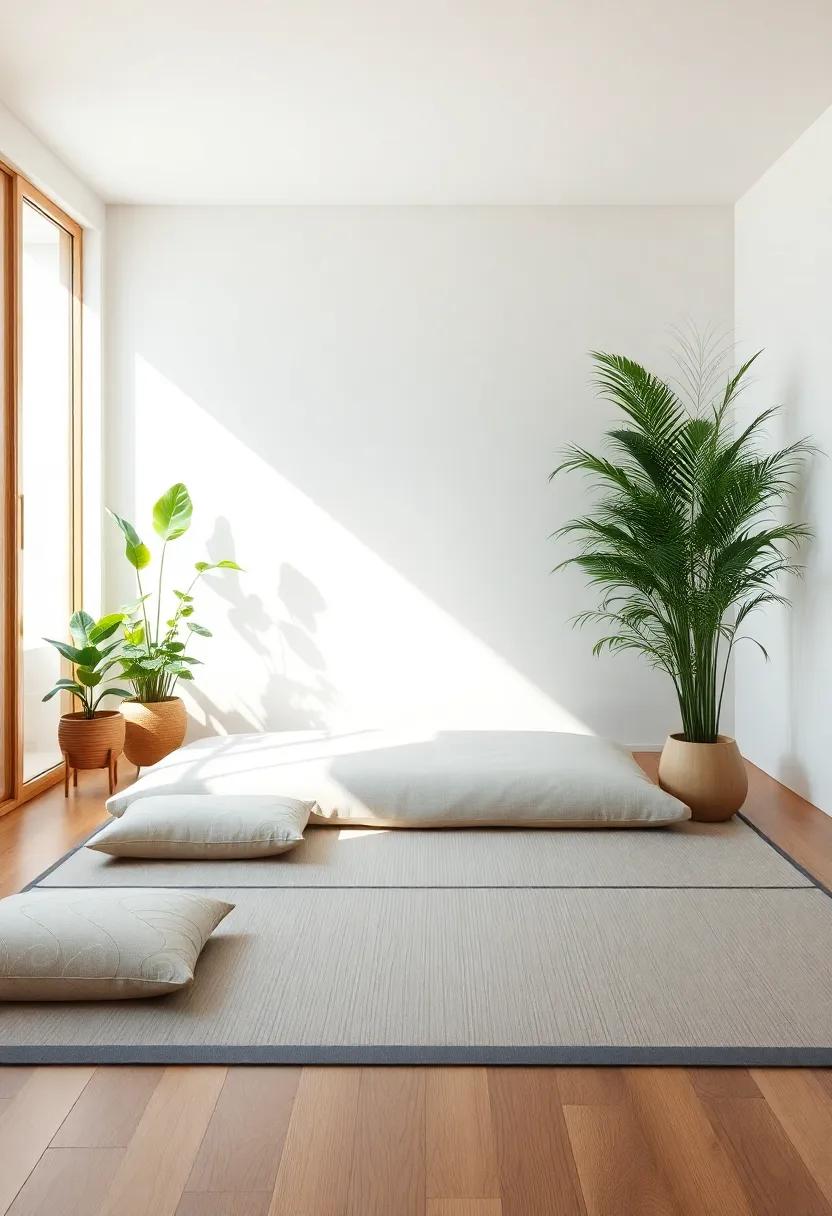
Transforming a bedroom into a serene retreat can be seamlessly achieved by integrating indoor plants, which provide not only aesthetic appeal but also numerous benefits. Incorporating greenery in your sleeping space creates a peaceful atmosphere, and the gentle rustle of leaves can serve as a calming backdrop, lulling you into a restful night. Low-light-loving varieties are perfect for this intimate setting, ensuring that the plants thrive while enhancing the tranquil vibe of your space. consider adding:
- Pothos: Known for its air-purifying qualities.
- Snake Plant: Ideal for minimal maintenance and resilience.
- Peace Lily: Its stunning blooms bring a touch of elegance.
Incorporating plants with thoughtful placement maximizes their soothing effect. Arranging them near your floor cushions fosters a harmonious blend of nature and relaxation. This visual connection to the outdoors enriches the overall experience, promoting mindfulness and tranquility. To further harmonize your bedroom, consider utilizing various spheres of plant life:
| Type of Plant | Benefit |
|---|---|
| Succulents | Low maintenance and aesthetic variety. |
| Spider Plant | Effective at removing toxins from the air. |
| Fiddle Leaf Fig | Creates a dramatic focal point with its large leaves. |
Cultural Inspirations: elements of Traditional Japanese Art
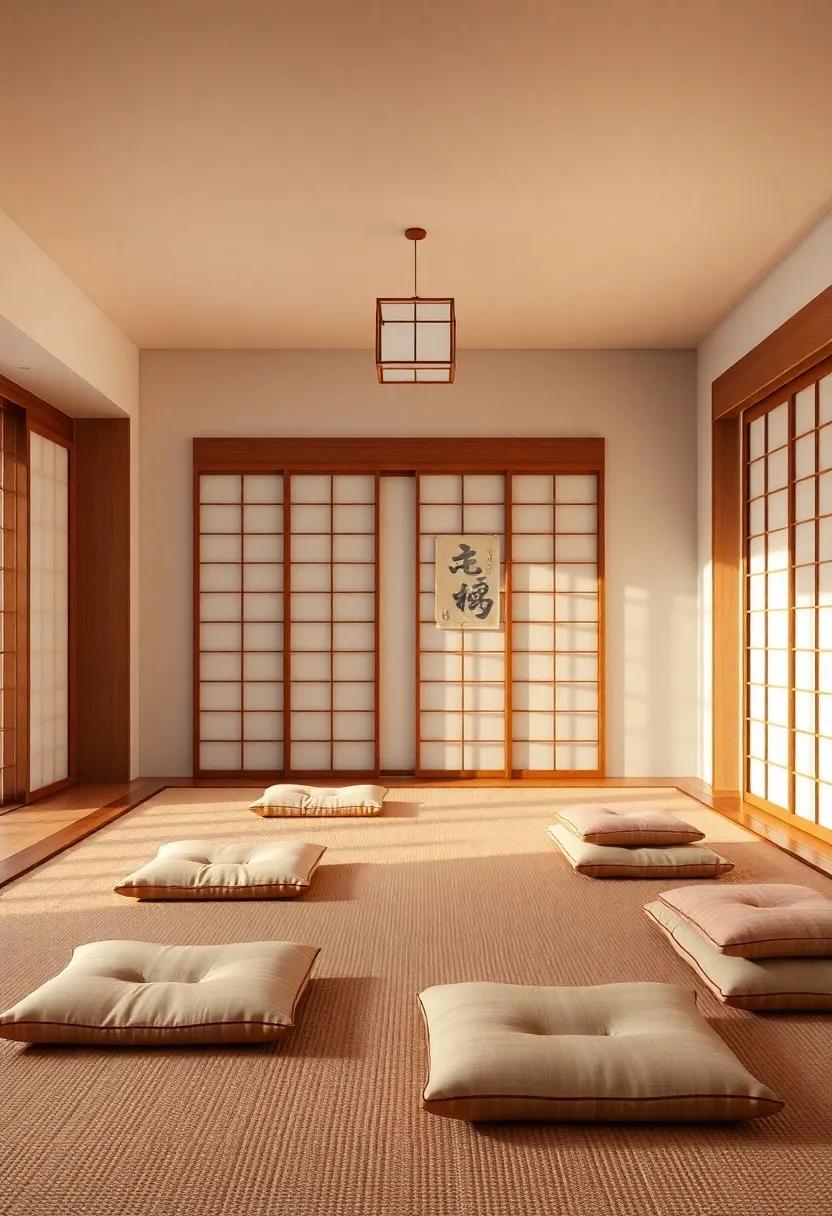
Japan’s traditional art forms are a rich tapestry of cultural expressions, frequently enough reflecting the profound respect for nature and simplicity that defines Japanese aesthetics. Many elements, such as calligraphy, ink painting, and ceramics, serve as a source of inspiration for the serene environments found in Japanese bedrooms. The meticulous attention to detail and the use of harmonious colors create spaces that evoke a sense of tranquility and balance. Floor cushions, or zabuton, embody this philosophy by providing both comfort and aesthetic appeal. Their presence offers an inviting atmosphere,encouraging relaxation and mindfulness,which are key components of traditional Japanese living.
Along with floor cushions, various other art forms contribute to enhancing the ambience of these spaces. Consider the following elements common in traditional Japanese bedrooms:
- Shoji Screens: These sliding doors made of wood and paper filter light and provide privacy without sacrificing openness.
- Tatami Mats: These woven straw mats bring warmth and softness underfoot, reinforcing a connection to nature.
- Ikebana: The art of flower arranging, offering beauty and tranquility while maintaining a minimalist style.
Here’s a simple table showcasing popular colors in traditional Japanese art and their meanings:
| Color | Meaning |
|---|---|
| Indigo | Serenity and Depth |
| Red | Passion and Energy |
| Gold | Harmony and Prosperity |
| Black | Elegance and Sophistication |
Integrating these elements into a bedroom space amplifies the serene qualities that make traditional Japanese art so captivating.By embracing simplicity, utilizing natural materials, and ensuring a thoughtful arrangement of decor, one can create a truly harmonious environment that reflects the essence of this beautiful culture.
Lighting Ambiance: Soft Illuminations for Calm Evenings
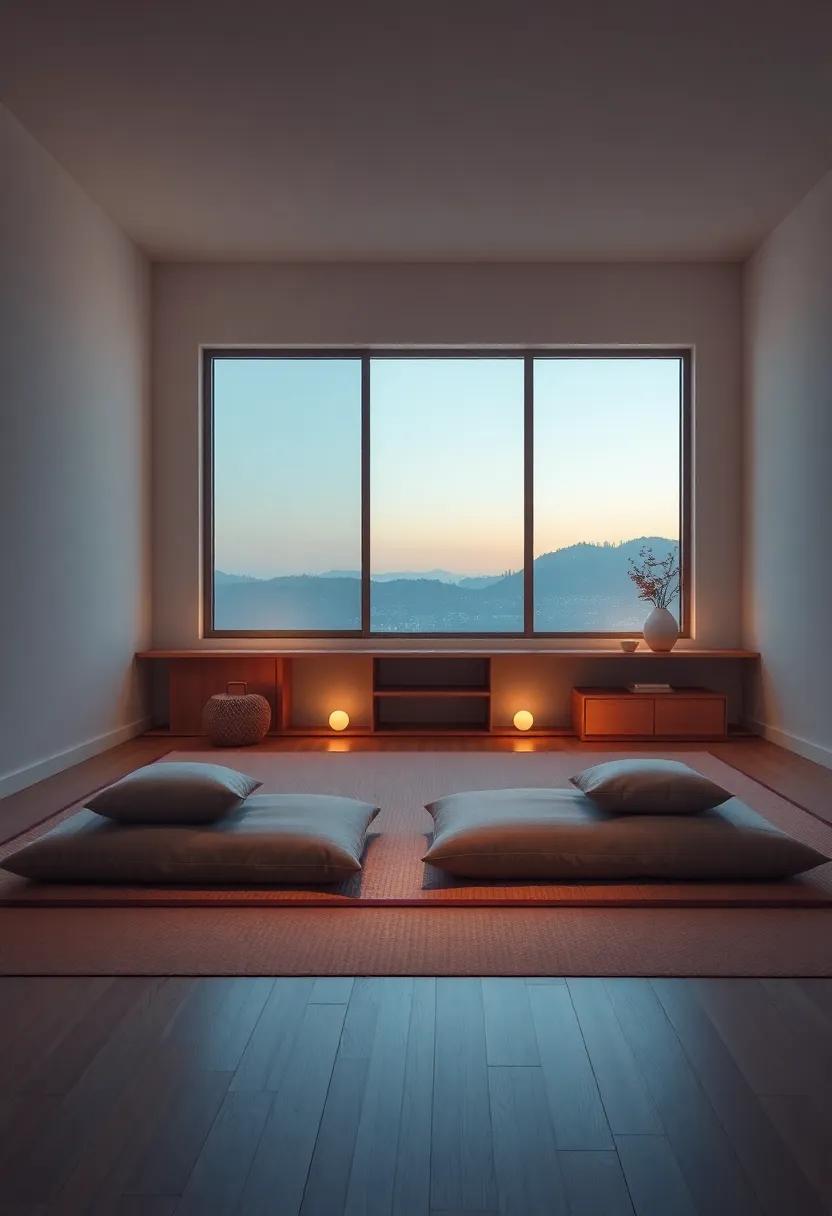
Creating a calming atmosphere in a Japanese bedroom goes beyond just aesthetic choices; it involves understanding the profound impact of lighting on tranquility. Soft illuminations, such as those found in paper lanterns or warm LED strips, can evoke a sense of peace and serenity.Consider incorporating these elements:
- Shoji Lamps: These provide a diffused glow that enhances the natural beauty of your room while maintaining a sense of privacy.
- Candlelight: The gentle flicker of candles adds a warm and inviting feeling, perfect for unwinding after a long day.
- Dimmer Switches: Installing dimmers lets you adjust the intensity of your lights, allowing for a customizable ambiance that can shift from vibrant to serene with ease.
The color temperature of your lighting plays a crucial role in setting a calming mood. Warm whites and soft yellows can definitely help promote relaxation, especially when paired with natural wood tones and neutral fabrics. Creating layers of light from various sources can create depth and focus within the space. A harmonious arrangement might include:
| Lighting Type | Purpose |
|---|---|
| Semi-Soft Ambient Lighting | Sets a warm base for the room. |
| Accent Lights | Highlight key features like artwork or plants. |
| Task Lighting | Provide focused illumination for reading or activities. |
Crafting a Personal Retreat: Elements of Pure Relaxation
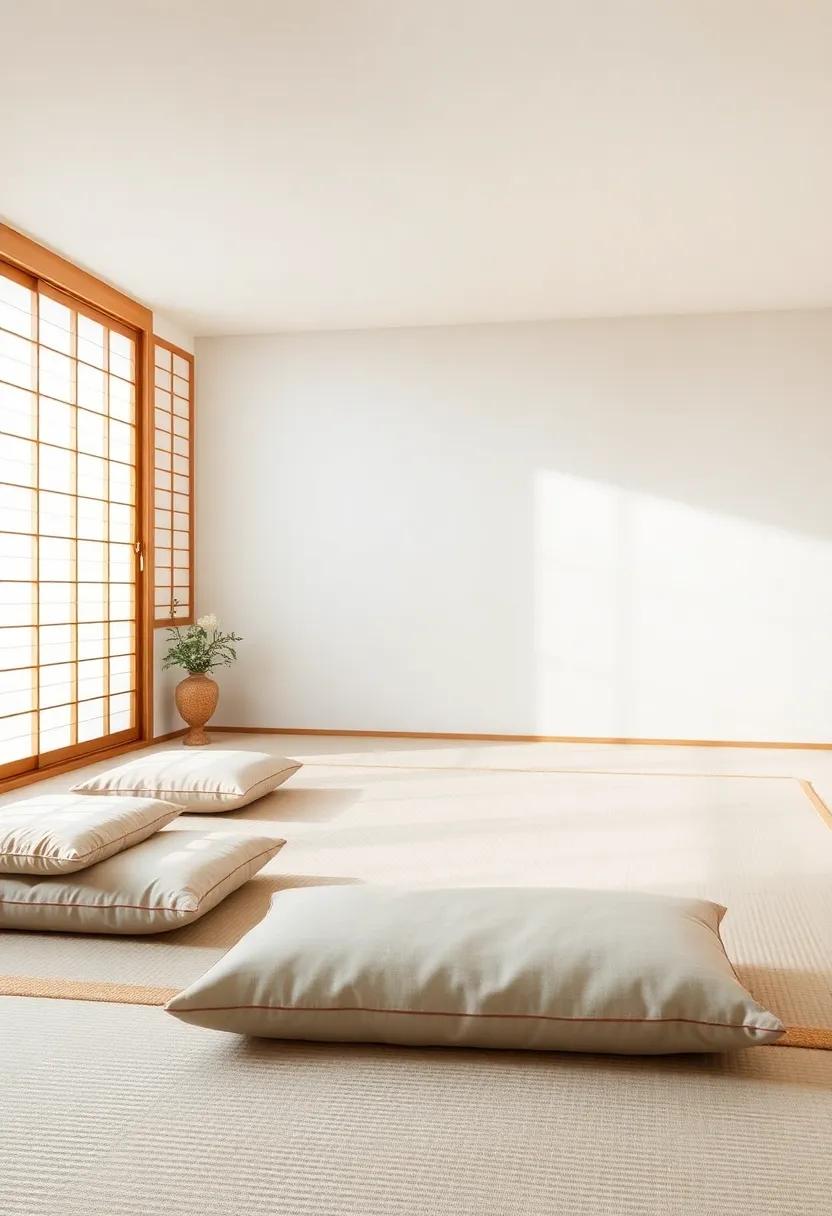
Creating a personal sanctuary starts with an understanding of the essential elements that promote relaxation and tranquility. The floor cushions, inspired by traditional Japanese style, invite a sense of groundedness while offering comfort during those moments of stillness. When you select the right colors, opt for soft, muted tones that mimic the natural world—think gentle greens, serene blues, and earthy browns. Incorporating textures through natural fabrics like linen and cotton not only enhances the aesthetic but also cultivates a cozy atmosphere.Layer these cushions to add depth and visual interest, creating a space that beckons you to sink in and unwind.
To further enrich your retreat, consider incorporating sensory elements that resonate with serenity.The gentle flicker of candles or the soft glow of paper lanterns can create a calming ambiance, enhancing your experience. natural soundscapes, such as the gentle trickle of a water feature or the soft rustle of bamboo, can transform your space into a haven of peace. Additionally, minimalist décor with curated accessories—like ceramic tea sets or retro incense holders—adds a touch of charm without overwhelming the senses. By cultivating an environment that harmonizes with nature and embraces simplicity, you foster an oasis of relaxation perfect for recharging your spirit.
Functional Elegance: Multi-Use Furniture in Japanese Style
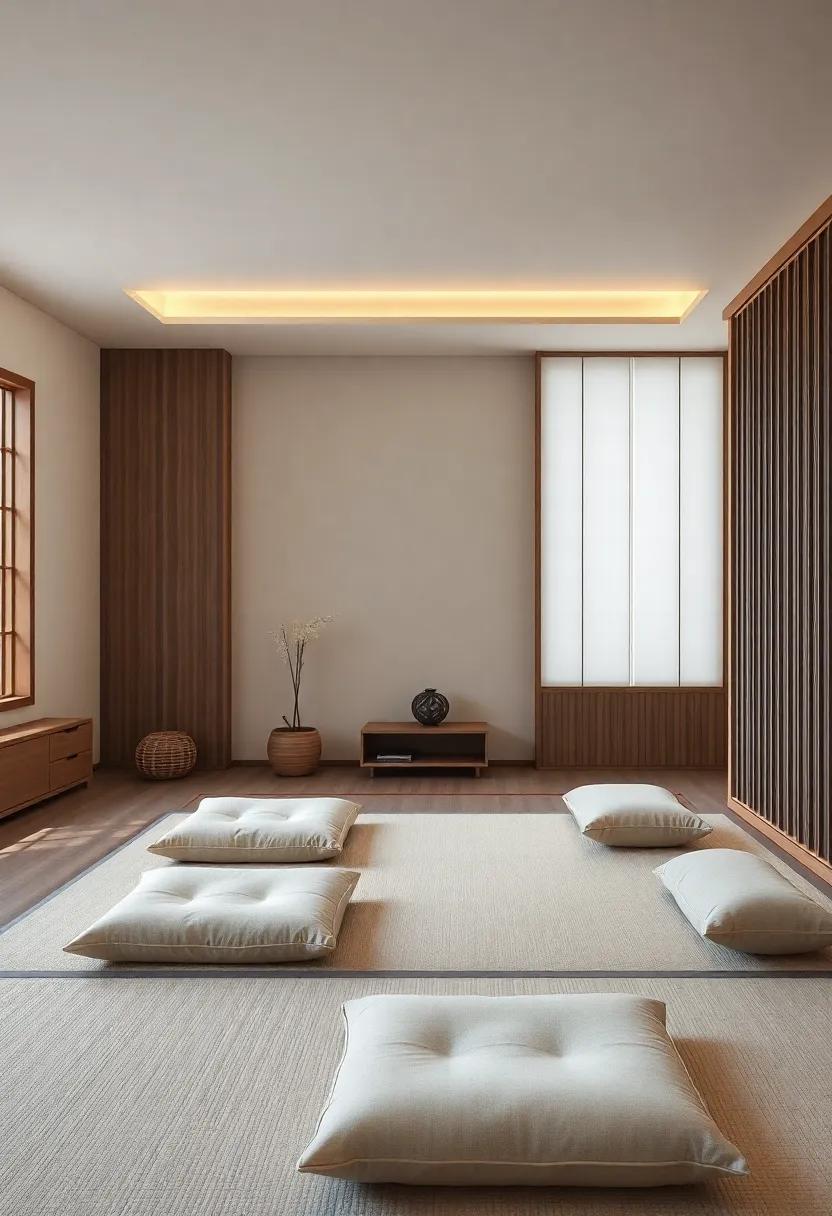
In Japanese interior design, the beauty of multi-use furniture shines through, striking a balance between functionality and aesthetic appeal. These pieces are carefully crafted to serve not just a single purpose but to enhance the overall harmony of the space. As a notable example, a tatami mat can effortlessly transition from a comfortable seating area to a serene space for meditation or sleep. Moreover, built-in storage solutions that nestle within benches or under raised platforms provide a clever way to keep the room clutter-free while adding to its minimalist charm.
This concept extends beyond mere utility, encouraging a lifestyle that appreciates simplicity and intent. Floor cushions, or zabuton, are quintessential elements that add warmth and comfort to a Japanese bedroom. They invite relaxation, prompting occupants to embrace the floor as part of their living experience. Consider these advantages of embracing this style:
- Space-saving: Items can seamlessly transform from seating to storage.
- Customizable: Easily adapt the arrangement to suit different occasions.
- Stylish design: They complement both traditional and modern aesthetics.
The Conclusion
As we draw the curtain on our exploration of Japanese bedrooms adorned with inviting floor cushions, we find ourselves enveloped in the serenity that such spaces evoke. These havens of tranquility invite us to pause, reflect, and appreciate the stillness amidst the chaos of modern life. With each meticulously chosen cushion, we can transform our personal sanctuaries into a symphony of comfort and simplicity, where every element serves a purpose and reflects a deep respect for nature and mindfulness.
In embracing the artful design of Japanese aesthetics, we not only cultivate a deeper connection to our surroundings but also foster a sense of inner peace. Whether you seek a serene reading nook, a meditative space, or simply a cozy corner to unwind, these traditional elements remind us of the beauty found in minimalism.
As you embark on your own journey to create a calming atmosphere,let the soft allure of floor cushions guide you towards a lifestyle that values simplicity,harmony,and peace. May your home become a reflection of tranquility, where every moment is an invitation to breathe, relax, and simply be.
 decordip Garden and patio decoration inspiration
decordip Garden and patio decoration inspiration 